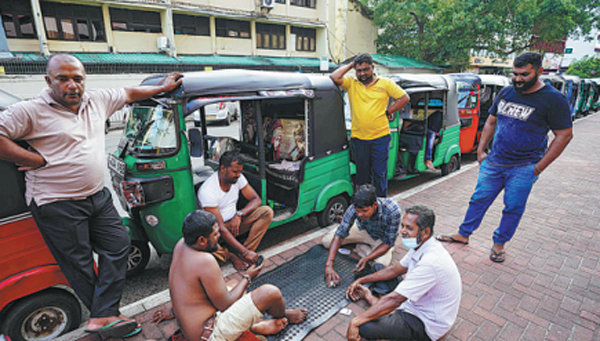Mix of factors to blame for Sri Lanka woes
By XU WEIWEI in Hong Kong | China Daily Global | Updated: 2022-06-22 09:39
Both domestic and external pressures plunged nation into crisis, experts say

A combination of domestic and external factors triggered Sri Lanka's most serious economic crisis in more than 70 years, with food and fuel shortages hitting hard, analysts say.
"I think (this is) definitely one of the worst economic crises since the founding" of modern-day Sri Lanka, said Lawrence Loh, director of the Centre for Governance and Sustainability at the National University of Singapore Business School. And "there are a lot of domestic and external reasons" for it, he said.
Prime Minister Ranil Wickremesinghe and other officials are holding discussions in Colombo with a visiting team of International Monetary Fund officials for a possible economic package, the Sri Lankan Daily Mirror reported. The IMF team is due to stay until June 30, the newspaper said.
Sirimal Abeyratne, an economics professor at the University of Colombo, said that while some recommendations from the IMF may be helpful in easing the nation's difficulties, "in the case of Sri Lanka, we should not take the IMF approach as the absolute truth that we need".
Loh said the Sri Lankan government must be careful in how it interacts with the IMF. Nothing comes for free, the academic said, and monetary agencies including the IMF and the World Bank are led by Western powers.
"From my previous experiences in Southeast Asia including Thailand, usually with the IMF assistance, many conditions were imposed. For example, they (the IMF) want to have a fiscal policy that cuts government expenditure or a devaluation of the local currency," he said, "For many countries that receive IMF programs they usually fall into some kind of hardship."
Of the domestic factors behind the crisis, he said: "The first one, of course, is regarding fiscal finance; they reduced the tax and then the government is running a very severe deficit.
"Then they tried to bring in more money supply, so it creates the inflation that devalues its currency. And the third problem is …too much borrowing from international bodies and countries."
The Russia-Ukraine conflict has added fuel to the crisis, as the two countries were big exporters to Sri Lanka. Also, Russia was a great source of tourists to the island country, and the rise in commodity prices due to the conflict has further increased the burden on Sri Lanka, Loh said.
Abeyratne said Sri Lanka's major foreign currency earners including tourism have been severely battered by the COVID-19 pandemic.
Food shortages
Now the nation is grappling with the onset of food shortages. Wickremesinghe told a meeting on Friday that steps were being taken to ease a crisis that could ultimately affect up to 5 million Sri Lankans, according to Daily Mirror Online of Sri Lanka.
The prime minister has set up a committee headed by parliamentarian Nimal Lansa to mitigate the food crisis. Special emphasis has been placed on food security, especially for care homes.
Sri Lanka's cabinet approved a proposal to declare Fridays a holiday for government employees. "With three nonworking days, public sector employees will be encouraged to carry out agricultural work to increase production in the country," a cabinet paper said.
The country banned the use of chemical fertilizer in April 2021, and agricultural output has declined as a result. "They want to do organic farming and be sustainable," said Loh, but increased costs and falling production have been exacerbated by global shortages.
As for fuel, Sri Lanka has suffered crippling shortages since February, handicapped by a lack of foreign reserves worsened by the pandemic and the Ukraine crisis.
Sri Lanka's Minister of Power and Energy Kanchana Wijesekera said on Sunday that the government has reached out to several Russian crude oil suppliers in hopes for an energy solution for the country, according to the Russian embassy in Colombo.
The minister said Sri Lanka's oil bill, as of June, has risen to $550 million a month.
Xinhua contributed to this story.
vivienxu@chinadailyapac.com
























